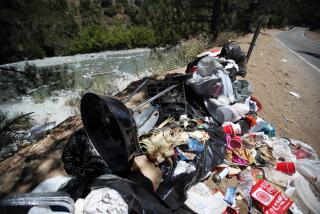Ecologist to Unabomber?
- Share via
In his manifesto, the Unabomber wrote, “Anyone who will read the anarchist and radical environmentalist journals will see that opposition to the industrial-technological system is widespread and growing.” This statement suggests a possible link between terrorism and radical environmental groups such as Earth First!. Some commentators assert that the Unabomber is only the tip of an iceberg of eco-terrorist cells planning to violently overthrow industrial society.
For the past five years, I have explored the diverse subcultures of radical environmentalism. This research convinces me that applying the terrorist label to radical environmentalism is inaccurate.
Though not all radical environmentalists think alike, most would agree on three broad claims. They believe that the natural world is inherently valuable, apart from its usefulness to human beings. Indeed, the Earth and all life is sacred. This essentially religious perception provides a powerful restraint on violence because humans and nonhumans alike are seen as deserving of respect because all life participates in a sacral landscape.
They also claim, as do many scientists, that humans are causing an unprecedented extinction crisis. Radical environmentalists believe that industrialism, consumerism and the domination of life by corporations intent on extending market capitalism into all planetary corners contribute to the global decline of biodiversity and the widespread desecration of land. These activists clearly deserve the label “radical” because they envision and hope for the destruction (or at least retreat) of industrial life ways. They generally believe that overturning industrialism is a prerequisite to ecological sanity and to the reharmonization of life on earth. But few among them think this will occur as a result of their activism, and to my knowledge, none sees terrorism as a solution. Rather, if we do not change our ways, they believe, nature will take its course; great suffering will flow, including more species extinctions, perhaps even our own, and eventually an ecological equilibrium will be restored.
Radical environmentalists do not see electoral politics as a way to bridge the gap between what is (the present extinction crisis) and what ought to be (the flourishing of all life forms). Democracy is seen as broken or as never having existed in the first place, and elections as dominated by corporate elites. Consequently, many laws are illegitimate, and illegal tactics, both civil disobedience and “monkey-wrenching” (movement parlance for destroying equipment used to damage the environment) may be morally permissible or even obligatory.
While we may find the above claims alarming, there is a logic woven through them. If all life is inherently valuable or has sacred worth, and if humans are causing widespread extinctions, and if political institutions are unable to respond quickly enough to prevent such extinctions, then direct action and even illegal resistance may be justifiable. After all, as the environmental slogan proclaims, “extinction is forever.” It may indeed be immoral to work exclusively “through the system,” waiting for political and legal reform, while species disappear forever.
Of course, sick minds may take radical environmental ideas and transform them into horrific justifications for violence. Tortured and troubled souls often are drawn to radical political movements. But my experience has been that those who advocate violence within radical environmental subcultures are met with forthright resistance and condemnation. Offending individuals are sanctioned and even shunned. They are also generally assumed to be agents provocateurs sent by corporate or government enemies to discredit the movement and bring violence upon it. But radical environmentalism has significant internal obstacles to violence, including nonviolence training for participants in civil disobedience campaigns.
While we certainly do not want to encourage terrorism, neither should we tolerate an antienvironmental McCarthyism that inaccurately tars diverse organizations and people as terrorists. The path away from the precipice of violent environmental conflict is to resist those who would demonize people on either side of these wrenching issues.
More to Read
The biggest entertainment stories
Get our big stories about Hollywood, film, television, music, arts, culture and more right in your inbox as soon as they publish.
You may occasionally receive promotional content from the Los Angeles Times.










